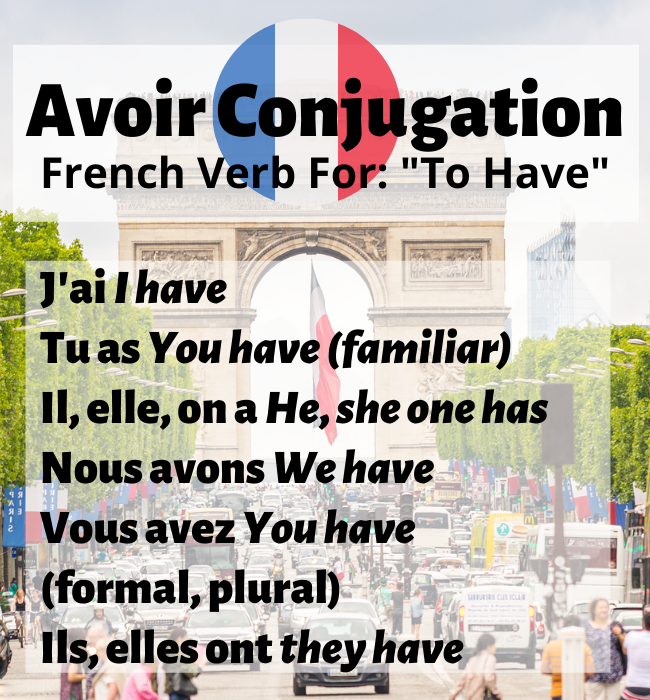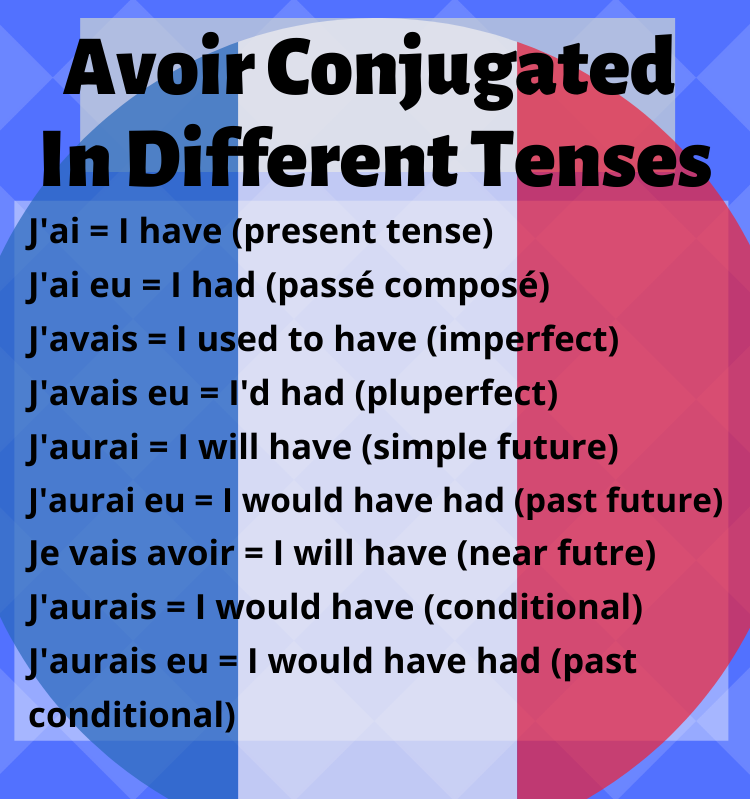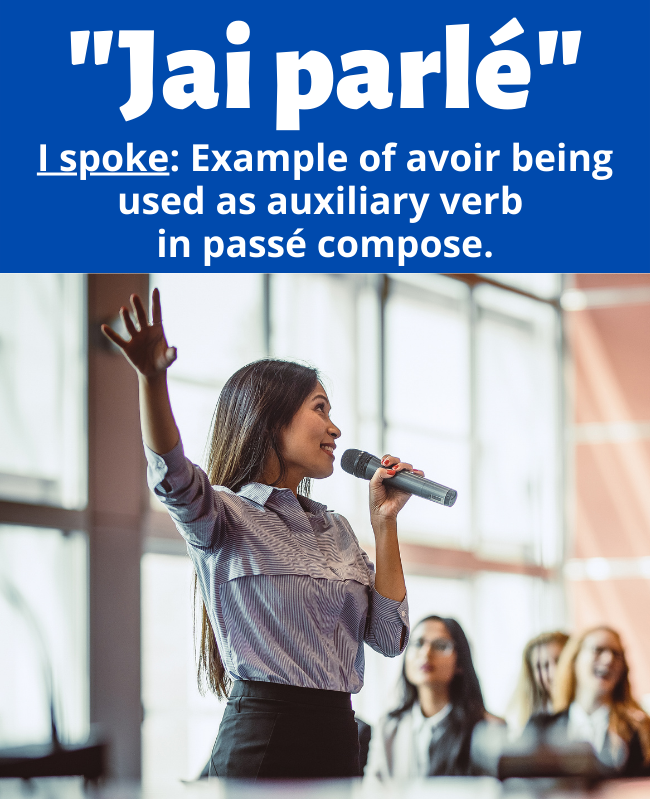Conjugation tables for avoir in French
The French verb avoir is one of the single most important verbs in the French language. The meaning of avoir is “to have”. The present tense conjugation of avoir is: J’ai (I have), tu as (you have), il, elle a (he, she has), nous avons (we have), vous avez (you have) and ils, elles ont (they have). Keep reading to find the complete avoir conjugation tables with example sentences.

Avoir is an irregular verb. This is because while the infinitive (to form) ends in -ir, the verb’s endings in the present tense do not follow the same pattern as regular verb in the -ir group, such as finir.
There are many forms of avoir as it appears in many tenses. This page will examine the various conjugation charts for each tense including the present tense, passé composé, imperfect, passé simple, pluperfect, future tense, near future, conditional, past conditional as well as present, past subjunctive and imperative.
This page will also examine several of the common avoir expressions such as avoir besoin de (to need) and avoir envie de (to want, fancy).
We suggest that you do not try to memorize this page all at once. The best way to learn the conjugations of avoir is to focus on one tense at a time, starting with the present tense and passé composé.
It also helps to go over the verb with French teacher. Here, you can learn about Frenchlearner.com’s private lessons.

Uses of avoir
The French verb avoir is very versatile and is used in specific “avoir expressions”. These are expressions where avoir is used in French where “to be” would be used in English.
1. Expressing Age
To say how old you are in French say: J’ai + number + ans, which translate to, “I have x years”. For example:
- J’ai vingt ans. I’m twenty years-old.
- Marie a dix-sept ans. Marie is seventeen years-old.
Do not say “Je suis vingt ans” because that would be wrong. You cannot use the verb être (to be) in expressing age in French. This page covers how to say your age in French.
2. Describing feelings and states of mind
- avoir faim to be hungry
- avoir soif to be thirsty
- avoir froid to be cold
- avoir chaud to be hot
- avoir _ ans to be _ years-old
- avoir besoin to need
- avoir envie to want
- avoir peur to be afraid, fear
- avoir raison to be right
- avoir tort to be wrong

Expressing need, want and desire
Avoir besoin de + noun (or infinitive) means “to need” in French. For example:
- J’ai besoin d’argent. I need money.
- J’ai besoin d’une voiture. I need a car.
- J’ai besoin d’étudier. I need to study.
- J’ai besoin de travailler. I need to study.
Avoir envie de + noun (or infinitive) means to want, fancy or desire. For example:
- J’ai envie d’une pizza. I want a pizza.
- J’ai envie de manger une pizza. I want to eat a pizza.
- J’ai envie de parler avec mon ami. I want to speak with my friend.
- J’ai envie d’apprendre le français. I want to learn French.
To express how somebody seems
Avoir l’air + adjective means “to seem”. For example:
- La fille a l’air heureuse. The girl seems happy
- Le garçon a l’air fatigué. The boy seems tired
- L’homme a l’air sympathique. The man seems nice.
- La femme a l’air gentille. The woman seems nice.
Avoir conjugation charts in common verb tenses
The following section show the different forms of avoir in the various verb tenses.
Present tense (present indicative)
Avoir is an irregular verb. This means that although the infinitive (or ‘to’ form) ends in -ir, its conjugation pattern in the present tense does not follow the pattern of regular -ir verbs.
The following table shows the conjugation of the verb avoir in the present tense (also called the present indicative).
| Subject pronoun | Verb ending | Example | English |
| Je | ai | J'ai un chien. | I have a dog. |
| Tu | as | Tu as un chat. | You have a cat. |
| Il/elle/on | a | Elle a une maison. | She has a house. |
| Nous | avons | Nous avons une voiture. | We have a car. |
| Vous | avez | Vous avez un ordinateur. | You have a computer. |
| Ils, elles | ont | Ils ont une télévision. | They have a television. |
Passé composé
The passé composé (past indefinite or compound past) is a French past tense used to describe past events which occurred at specific times. It is referred to as a “compound tense” because it combines the present tense of avoir with a past participle.
In the case of conjugating avoir in the passé composé “j’ai” is combined with “eu” to form “j’ai eu”, which means I had. The “ai” is an auxiliary or helping verb and “eu” is the past participle (had).
| Avoir in passé composé | English | Example sentence | Translation |
| J'ai eu | I had | J'ai eu la grippe. | I had the flu. |
| Tu as eu | You had (familiar) | J'ai eu votre lettre. | I received your letter. |
| Il, elle, on a eu | He, she, one had | Elle a eu une bonne note. | She got a good grade. |
| Nous avons eu | We had | Nous avons eu les bonnes nouvelles. | We got the good news. |
| Vous avez eu | You had (formal, plural) | Vous avez eu peur. | You were afraid. |
| Ils, elles ont eu | Ils ont eu | Ils ont eu besoin de travailler. | They needed to work. |
Imperfect tense
The French imperfect tense (l’imparfait de l’indicatif or imperfect indicative) is used to describe actions that used to occur or were occurring over an unspecified period of time.
In the first-person singular (je) form, “j’avais” translates to both “I used to have” and “I was having”. For example, “Quand j’avais quinze ans” translates to “When I was 15 years-old.
| Avoir in imperfect | English | Example sentence | English |
| J'avais | I used to have, was having | J'avais un vélo. | I used to have a bike. |
| Tu avais | You used to have, were having (familiar) | Tu avais froid. | You were cold. |
| Il, elle, on avait | He, she, one used to have, was having | Il avait faim. | He was hungry. |
| Nous avions | We used to have, were having | Nous avions très peur. | We were very afraid. |
| Vous aviez | You used to have, were having (formal, plural) | Vous aviez bessoin de vendre la maison. | You needed to sell the house. |
| Ils, elles avaient | They used to have | Ils avaient envie de manger. | They wanted to eat. |
Passé Simple
The French passé simple (simple past) is a literary past tense that used in literature and publications. While not one hundred percent necessary to know speaking, it’s important to recognize the passé simplé for reading stories.
Grammatically speaking, the passé simple is use wherever the passé composé is used. The passé simple is called a “simple” tense because only one work is needed for each form. There is no auxiliary or helping verb.
| Avoir in passé simple | English | Example sentence | English |
| J'eus | I had | J'eus de la chance. | I was lucky. |
| Tu eus | You had (familiar) | Tu eus un rhume. | You had a cold. |
| Il, elle eut | He, she had | Elle eut les nouvelles. | She got the news. |
| Nous eûmes | We had | Nous eûmes tort. | We were wrong. |
| Vous eûtes | You had (formal, plural) | Vous eûtes l'idée. | You had the idea. |
| Ils, elles eurent | They had | Ils eurent trois enfants. | They had three children. |

Pluperfect
The French plus-que-parfait (pluperfect) is used to express anteriority with one past event occurring before another one.
It is formed by expressing auxiliary verb in the imperfect with the past participle. For example, “J’avais eu” means “I’d had” and “tu avais eu” means “you’d had”.
| Avoir in pluperfect | English | French example | English |
| J'avais eu | I had had | Je n'ai pas eu les nouvelles aujourd'hui parce que je les avait eues hier. | I didn't receive the news today because I'd received them yesterday. |
| Tu avais eu | You had had (familiar) | Tu n'as pas eu la lettre aujourd'hui parce que tu l'as eue heir. | You didn't get the letter today because you'd gotten it yesterday. |
| Il, elle, on avait eu | He, she, one had had | Il n'a pas eu la grippe ce mois parce qu'il l'a eue le mois passé. | He didn't get the flu this month because he'd had it last month. |
| Nous avions eu | We'd had | Nous n'avons pas eu le vaccin en juillet parce que nous n'avions eu en juin. | We didn't get the vaccine in July because we'd gotten it in June. |
| Vous aviez eu | You had had (plural, formal) | Vous n'aviez pas eu la réponse aujourd'hui parce que vous l'aviez eu hier. | You didn't get the reply today because you'd gotten it yeserday. |
| Ils, elles avaient eu | They had had | Ils n'ont pas eu une réponse ce soir parce qu'ils l'avaient eue ce matin. | They didn't get the answer this evening because they'd gotten it this morning. |
Future tense
The French futur simple refers to the future tense (future indicative or simple future). It is called a “simple tense” because only one word is used to form the tense. The futur simple is used to describe future events that are almost 100% certain.
For the verb avoir, the futur simple endings (-ai, -as-, -a, -ons, -ez, -ont) are attached to the stem “aur”. Hence, “j’aurai” translates to “I will have” and “tu auras” translates to “you will have”.
| Avoir in futur simple | English | French example | Translation |
| J'aurai | I will have | J'aurai une nouvelle voiture. | I will have a new car. |
| Tu auras | You will have (familiar) | Tu auras chaud. | You will be hot. |
| Il, elle, on aura | He, she, one will have | Elle aura peur. | She will be scared. |
| Nous aurons | We will have | Nous aurons un bon repas. | We will have a good meal. |
| Vous aurez | You will have (formal, plural) | Vous aurez faim. | You will be hungry. |
| Ils, elles auront | They will have | Ils auront envie de manger. | They will want to eat. |
Past future
The futur antérieur refers to the past future tense. These are events that will have occurred in the future. For example, “I will have already eaten before you get home”.
The past future for the verb avoir is formed by combing the auxiliary verb in the futur simple (j’aurai) with the past participle (eu).
For example, “J’aurai eu” translates to “I will have had” or “I will have received”. “Tu auras eu” means you will have had or received.
| Avoir in passé antérieur | English | Example sentence | English |
| J'aurai eu | I will have had | J'aurai eu la grippe. | I will have had the flu. |
| Tu auras eu | You will have had (familiar) | Tu auras eu les nouvelles. | You will have received the news. |
| Il, elle, on aura eu | He, she, one will have had | Elle aura eu deux enfants. | She will have had two kids. |
| Nous aurons eu | We will have had | Nous aurons eu une bonne opportunité. | We will have had a good opportunity. |
| Vous aurez eu | You will have had (formal, plural) | Vous aurez eu de la chance. | You will have been lucky. |
| Ils, elles auront eu | They will have had | Elles auront eu raison. | They will have been right. |
Near future tense
The futur proche (near future tense) is formed with a conjugated form of aller (to go) followed by avoir in the infinitive (to) form.
This future tense is used to express actions in the futre that will occur with a higher level of certainty than the in the futur proche.
For example, “Je vais avoir une bonne note” means “I’m going to get a good grade”. This sentence is being expressed with a high degree of certainty.
| Avoir in futur proche | English | French example | Translation |
| Je vais avoir | I'm going to have | Je vais avoir un petit frère. | I'm going to have a younger brother. |
| Tu vas avoir | You're going to have (familiar) | Je vais avoir une petite soeur. | You're going to have a little sister. |
| Il, elle, on va avoir | He, she, one is going to have | Elle va avoir 40 ans. | She's going to turn 40. |
| Nous allons avoir | We're going to have | Nous allons avoir besoin de travailler. | We're going to need to work. |
| Vous allez avoir | You're going to have (plural, formal) | Vous allez avoir envie de manger. | You're going to want to eat. |
| Ils, elles vont avoir | They're going to have | Ils vont avoir faim. | They're going to be hungry. |
Conditional
The French conditionnel présent (present conditional) is the “would” tense. The conditional is formed by attaching a set of endings to the same stem as the futur simple (aur).
The endings are: -ais, -ais, -ait, -ions, -iez, -aient. Thus, “j’aurais” translates to “I would have”.
The conditional is used to express actions that would occur if another action was possible. For example, “J’aurais plus de temps si je n’avais pas tant de travail” (I’d have more time if I didn’t have so much work).
| Avoir in present conditional | English | French example | English |
| J'aurais | I would have | J'aurais une belle voiture si j'avais plus d'argent. | I'd have a nice car if I had more money. |
| Tu aurais | You would have (familiar) | Tu aurais plus de temps si tu n'etais pas si occupé. | You would have more time if you weren't so busy. |
| Il, elle, on aurait | He, she, one would have | Elle aurait un bon travail si l'économie était plus forte. | She'd have a good job if the economy were stronger. |
| Nous aurions | We would have | Nous aurions une belle maison si les prix n'étaient pas si élevés. | We'd have a nice house if the prices weren't so high. |
| Vous auriez | You would have (formal, plural) | Vous auriez plus de chance si vous n'étiez pas tellement paresseux. | You'd have more luck if you weren't so lazy. |
| Ils, elles auraient | They would have | Ils auraient des enfants mais pour le moment ils se concentrent sur leur travail. | They'd have kids but for now they're focusing on their work. |
Past conditional
The French conditionnel passé (or past conditional) refers to action that would have occurred. It is formed by combing the auxiliary verb avoir in the present conditional with the past participle.
For example, “J’aurais eu” translates to “I would have had”. In the negation, “Je n’aurais pas eu” translates to “I wouldn’t have had”.
| Avoir in past conditional | English | Example sentence | English |
| J'aurais eu | I would have had | J'aurais eu une bonne note mais je n'ai pas étudié. | I would have got a good grade but I didn't study. |
| Tu aurais eu | You would have had (familiar) | Tu aurais eu un bon travail si tu avais étudié. | You would have had a good job if you'd studied. |
| Il, elle, on aurait eu | He, she, one would have had | Elle aurait eu plus de temps libre si elle avait mieux planifié. | She would have had more free time if she'd planned better. |
| Nous aurions eu | We would have had | Nous aurions eu une fête si nous avions su que c'était son anniversaire. | We would have had a party if we'd known it was his birthday. |
| Vous auriez eu | You would have had (plural, formal) | Vous auriez eu une bonne idee si vous aviez mieux réfléchi. | You would have had a good idea if you'd have better thought it over. |
| Ils, elles auraient eu | They would have had | Ils auraient eu trois voiture si n'avaient pas vendu la Mercedes. | They would have had three cars if they hadn't sold the Mercedes. |
Present subjunctive
The présent du subjunctif (present subjunctive) is a mood used for expressing wishes, desires, emotions and doubts. It almost always involved two subjects separated by que (that).
For example, “Je souhaite que tu aies trois enfants” (I want you to have three kids). In this sentence, the conjugated verb “aies” is in the subjunctive form.
| Avoir in present subjunctive | English | Example sentence | English |
| que j'aie | that I have | Elle souhaite que j'aie deux enfants. | She wants me to have two kids. |
| que tu aies | that you have (familiar) | Je suis content que tu aies un nouveau chien. | I'm happy that you have a new dog. |
| qu'il/elle ait | that he, she one has | Je doute qu'il ait assez de temps. | I doubt that he has enough time. |
| que nous ayons | that we have | Il exige que nous ayons une discussion. | He requires that we have a discussion. |
| que vous ayez | that you have (formal, plural) | Il faut que vous ayez une explication. | You need to have an explanation. |
| qu'ils/elles aient | that they have | Je veux qu'ils aient un peu plus de patience. | I want them to have a bit more patience. |
Past subjunctive
When forming the subjonctif passé (past subjunctive), the auxiliary verb is expressed in the present subjunctive and is combined with the past participle.
For the verb avoir, “que j’aie eu” translates to “that I had” and “que tu aies eu” translates to “that you had”.
The last portion of our subjunctive lesson covers the past subjunctive.
| Avoir in past subjunctive | English | Example sentence | English |
| que j'aie eu | that I had | Elle est ravie que j'aie eu une grande famille. | She's delighted that I had a big family. |
| que tu aies eu | that you had (familiar) | Je suis content que tu aies eu cette bonne idée. | I'm happy that you had this good idea. |
| qu'il, elle, on ait eu | that he, she, one had | Je doute qu'il ait eu un bon prétexte. | I doubt he had a good excuse. |
| que nous ayons eu | that we had | Ils sont contents que nous ayons eu cette opportunité. | They're happy we had this opportunity. |
| que vous ayez eu | that you had (formal, plural) | Je suis désolé que vous ayez eu ce problème. | I'm sorry you had this problem. |
| qu'ils, elles aient eu | that they had | Nous sommes contents qu'ils aient eu trois enfants. | We're happy they had three kids. |
Imperative
The French imperatif is the imperative mood, which is use for giving commands. When conjugated in the imperative, avoir translates to “Have!” or “Don’t Have!”.
The following table shows avoir in the affirmative imperative (positive commands).
| Avoir - affirmative imperative | English | French example | English |
| Aie! (tu, familiar) | Have! | Aie plus de patience! | Have more patience! |
| Ayons! | Let's have! | Ayons confiance dans le système! | Let's have trust in the system! |
| Ayez! (Vous, formal and plural) | Have! | Ayez de l'espoir! | Have hope! |
This table shows avoir in the negative affirmative (negative commands).
| Avoir - affirmative imperative | English | French example | English |
| N'aie pas! (tu, familiar) | Do not have! | N'aie pas peur! | Don't be afraid! |
| N'ayons pas! | Let us not have! | N'ayons pas confiance dans le gouvernement! | Let us no have trust in the government! |
| N'ayez pas! (Vous, formal and plural) | Do not have! | N'ayez pas peur! | Don't be afraid! |

Avoir: auxiliary verb for the passé compose
The passé composé is one of French’s two main past tenses. To form the passé composé, an auxiliary or helping verb is combined with a past participle.
The auxiliary verb can be either avoir or être in the present tense, depending on the verb.
For example, to say “I spoke”, j’ai (I have) is combined with the past participle parlé to form: “J’ai parlé” (I spoke.
The following is the conjugation of parler (to speak) in the passé composé, using avoir as the auxiliary verb.
- J’ai parlé I spoke
- Tu as parlé You spoke (familiar)
- Il, elle, on a parlé He, she, one spoke
- Nous avons parlé We spoke
- Vous avez parlé You spoke (plural, formal)
- Ils, elles ont parlé they spoke
Most French verbs use avoir conjugated in the present tense as the helping verb. Verbs which use avoir as an auxiliary verb tend to be transitive verbs.
A list of both intransitive and reflexive verbs use être in the present tense as an auxiliary verb. This page covers the passé composé in detail.




